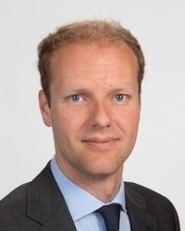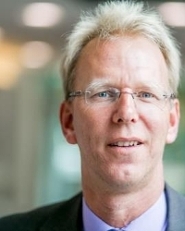
Our economists in The Hague - research and teaching
The Department of Economics at Leiden Law School teaches courses in both Leiden and The Hague to more than 1700 students.
Public Administration & Economics
The Department of Economics teaches a total of 19 courses in the Bestuurskunde programmes (Public Administration).
The bachelor programme in which the department is involved has two tracks: Beleid, Bestuur en Organisatie (BBO) (Policy, Governance and Organisation) and Economie, Bestuur en Management (EBM) (Economics, Governance and Management). The track Beleid, Bestuur en Organisatie is a traditional course on public administration where the economists teach a number of courses, for example on government finance. The other popular track is Economie, Bestuur en Management. This track is a unique collaboration between the Institute of Public Administration and the Department of Economics. Students on this track follow courses on both public administration and economics.

Dr. Olaf van Vliet: “Public administration and economics are both involved in many aspects of social issues. Consider for example reforms in labour market policy. This government has amended the law on dismissal and the Unemployment Insurance Act (WW). From the viewpoint of economics, we analyse the effects of these policy changes on employment and income distribution for example. Students study the decision-making process that precedes changes in policy from the perspective of public administration. It is then interesting to look at the interaction between the economic and public administration aspects. These are the kinds of issues that we look at in the bachelor track ‘Economie, Bestuur en Management’.”
To offer EBM students a follow-up course at master level, a new master programme Economics and Governance was launched this current academic year. More than 50 Dutch and international students are taking this master and as of February 2017 they will be taking courses at the new Wijnhaven building in The Hague.
Involved from the very start of Leiden University College
Staff from the Department of Economics have been involved in teaching at LUC from its establishment when students were taught at the historic building located on the Lange Voorhout. Since then, LUC has expanded considerably and with it the corresponding teaching package of the economists. In the current academic year the Department of Economics is teaching nine course at LUC. Students come from all over the world and the courses are taught in English.
Specialist Course on Social Security
For some years now the department has taught modules in the specialist course on Sociale Zekerheid (Social Security). The Centre for Professional Learning organises this course for organisations including the Ministry of Social Affairs and Employment, the Employment Insurance Agency (UWV) and the Social Insurance Bank (SVB). In our modules we focus on recent scientific insights into policy practice in the field of social and labour market policy.
Socially relevant research
Much of the research carried out by the Leiden economists finds its way to ministries in The Hague. An example is the extensive reference to the research on the adequacy of pensions in the Budget Memorandum and the Perspective Memorandum on the Pension System (by the Ministry of Social Affairs and Employment). After Professor Kees Goudswaard chaired a government committee on the future of pensions, in recent years he has been chairman of the Social and Economic Council (SER) Committee on the Future of the Dutch Pension System , which advises the government on the reform of the system, partly within the framework of the broad social dialogue initiated by the government on the pension system.
Research performed in the area of income distribution and tax reform is also regularly referred to.

Professor Koen Caminada: “Leiden research also played a role in the social discussion on the inequality of income distribution set in motion by Thomas Piketty, because using our data we could chart income distribution in the Netherlands and also supplement this with data on accumulated pension assets. As a result, we were invited to participate at a Round Table discussion at the Lower House when Thomas Piketty’s visited the Dutch parliament” .
Other examples include the contribution to the Interdepartmental Policy Research on the Financial Position of the Elderly and recently the research performed by the department for the Social and Economic Council on the pensions of self-employed workers without employees (zzp). For this purpose, the department also collaborates with the Scientific Council for Government Policy (WRR) in the area of flexibility on the labour market.
